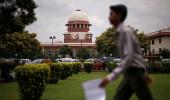The Supreme Court is scheduled to consider in-chambers on Tuesday a batch of pleas seeking review of its judgment which held that states are constitutionally empowered to make sub-classifications within the Scheduled Castes, which form a socially heterogeneous class, for granting reservation.

As per the cause list, a seven-judge Constitution bench comprising Chief Justice D Y Chandrachud and Justices B R Gavai, Vikram Nath, Bela Trivedi, Pankaj Mithal, Manoj Misra and Satish Chandra Sharma is likely to take up the matter at 1.35 pm.
On August 1, the top court had held that states are constitutionally empowered to make sub-classifications within the Scheduled Castes, which form a socially heterogeneous class, for granting reservation for the uplift of castes that are socially and educationally more backward.
The apex court, however, made it clear that states have to make sub-classification on the basis of 'quantifiable and demonstrable data' of backwardness and representation in government jobs and not on 'whims' and as a matter of 'political expediency'.
A seven-judge Constitution bench headed by Chief Justice Chandrachud, by a majority of 6:1, set aside the apex court's five-judge bench verdict of 2004 in the E V Chinnaiah vs State of Andhra Pradesh case which had held that no sub-classification of Scheduled Castes (SCs) can be allowed as they are a homogeneous class in themselves.
Except for Justice Trivedi, the other five judges concurred with the findings of the CJI.
Justice Trivedi, in her 85-page dissenting judgement, said it is only Parliament which can include a caste in the SC list or exclude it, and states are not empowered to tinker with it.
The SCs, she ruled, are a 'homogeneous class' incapable of being sub-classified further.
Overruling the Chinnaiah verdict, the CJI dealt with the scope of sub-classification of SCs and said the objective of any form of affirmative action, including the sub-classification, is to provide 'substantive equality of opportunity for the backward classes'.
'The state can sub-classify, inter alia, based on inadequate representation of certain castes. However, the state must establish that the inadequacy of representation of a caste/group is because of its backwardness,' it said.
The state will have to collect data on inadequacy of representation in government jobs because it is used as an indicator of backwardness, it said.
A dispute over sub-classification arose after certain states, including Punjab, made laws to sub-classify SCs to grant more quota benefits to certain castes.
The top court had reserved the verdict on February 8 on pleas seeking review of the Chinnaiah judgement, which had ruled all SCs which suffered ostracisation, discrimination and humiliation for centuries represented a homogeneous class incapable of being sub-categorised.











